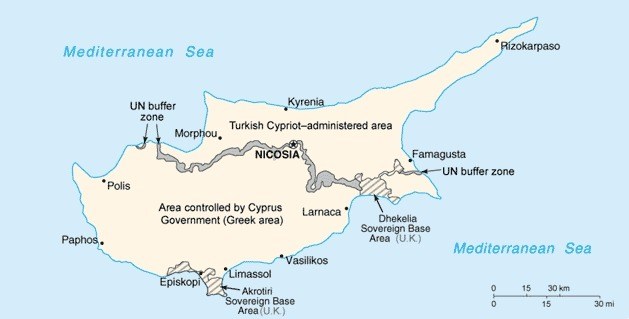Since the interruption of the talks in 2017, the Greek and Turkish Cypriot sides will resume UN-led talks in April and discuss a solution to one of the world’s longest running international conflicts.
Ahead of the planned talks, EU foreign policy chief Josep Borrell recently visited Nicosia to meet the leaders of the two sides and offer EU’s support in the peace process.
“I met the two Cypriot leaders and come out of the talks believing that while the road ahead will not be easy, solutions can be found. I encouraged them to seize the opportunity of the 5+1 informal meeting in Geneva next month and come to the talks prepared to compromise,” he said in a statement.
The 5+1 format refers to the two Cypriot sides, the three guarantor powers, the UK, Turkey and Greece, and the UN. Two of the guarantor powers are not EU member states. UK still keeps two military bases in Cyprus and Turkey has not withdrawn its troops from northern Cyprus. EU’s role has been limited to that of an “active observer”.
Borrell recalled that the process was not starting from scratch and referred to the UN Security Council resolutions and the so-called Guterres framework, named after the UN Secretary-General, including six conflict issues related to territory, political equality, property, equivalent treatment, and security and guarantees.
In fact, before the talks collapsed last time, the conflict issues had been narrowed down to only a few percent of previous differences, judging by the negotiators from both sides. Alexander Downer, a former Australian foreign minister and UN envoy confirmed that the differences, after endless hours of negotiations, have been limited to about 5 %, at least as regards property and border issues.
It would be logical to expect that the talks would resume where they ended last time, aiming at bridging the remaining differences between the two sides, but it appears that the position of the Turkish Cypriot side has been sharpened. According to its president Ersin Tatar, “a permanent agreement in Cyprus can only be based on two equal sovereign states”.
He also questioned EU’s role. “It will not be appropriate for the EU to participate in this meeting because as it is known, Greece and South Cyprus are EU members and it is not realistic to expect the EU to be a neutral party in this meeting.”
Borrell, on his part, tried in a blog post after his meeting with Tatar, to highlight the importance of EU’s role and leverage in solving the Cyprus issue. “The EU supports fully the UN line.”
“The Cyprus problem is clearly an EU problem,” he wrote. “Cyprus is a member state of the Union, now and after reunification; regional stability and prosperity in the Eastern Mediterranean is closely bound to a solution to the Cyprus problem.” A future settlement needs to comply with the EU acquis and safeguards, the integrity and decision-making responsibilities and processes of the EU.
He added that Turkish Cypriots are EU citizens and the EU has always been clear: the Cyprus’ EU membership is for the benefit of all Cypriots. This has also been reflected in the EU financial assistance to the northern part of Cyprus to prepare it for EU membership.
Asked by The Brussels Times about EU’s position on the forthcoming talks on the Cyprus issue, an EU spokesperson confirmed that it was unchanged and based on the UN parameters but declined to elaborate on EU’s role in the talks.
M. Apelblat
The Brussels Times

